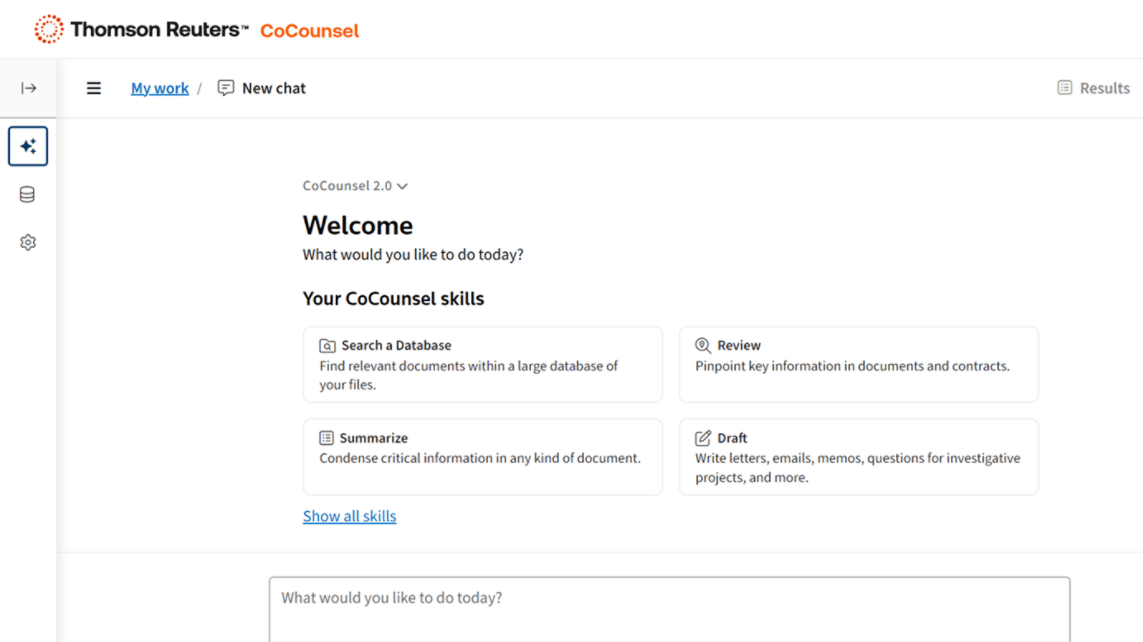Legal professionals are abuzz about the power of AI to transform the practice of law, but it can be hard to know which tools to trust for your practice.
“It is an enormously exciting time at the intersection of technology and professional information,” Thomson Reuters CEO Steve Hasker wrote for Reuters. “We are on the verge of a revolution in creating new efficiencies by getting professionals the right answers faster.”
Along with his excitement about the possibilities of AI, Hasker also takes the question of trust seriously. “Before they can be fully trusted to do important work, [generative AI models] need to be trained using comprehensive, authoritative data sets,” Hasker wrote. “Perhaps even more importantly, that process needs to be intermediated by human subject matter experts who understand the nuances and the context and have the power to override inaccuracies… Put simply, Humans + AI is the only way we will be successful.”
Hasker is pointing to the three important criteria for choosing AI-powered tools for legal practice: domain expertise, quality data, and AI experts.
|
Steve Hasker
President & CEO, Thomson Reuters
Jump to ↓
| Domain expertise |
| Quality data |
| AI experts |

CoCounsel
Bringing together generative AI, trusted content, and expert insights
Meet your AI assistant ↗Domain expertise
AI systems are designed and trained by human beings. Human beings structure the data, create test queries, and give the system feedback on how well it answered the query so it can perform better the next time.
When you are choosing AI-powered tools for your legal practice, be sure to look closely at the expertise behind the system. Legal experts are a critical component of effective assistant-like tools, along with quality data and AI experts.
|
From the white paper,
Not all legal AI is created equal
Quality data
Have you heard of hallucinations? In generative AI speak, a hallucination is a correct-sounding response that is utterly wrong. The system looked through the data and crafted a response out of words that seemed most likely to go together.
Remember the attorneys who were sanctioned for using fake citations from ChatGPT? They cited six fake cases and blamed ChatGPT for the mistake. They said in a statement, “We made a good faith mistake in failing to believe that a piece of technology could be making up cases out of whole cloth.”
But tools like ChatGPT will create hallucinations, because they aren’t drawing from a verified and continually updated set of data, and they aren’t watched over by human editors. They also don’t make it easy for you to double-check the documents and guidance they serve up.
Westlaw, Practical Law, and other products from Thomson Reuters build on 150 years of human insight, categorization like the Key Number System, and editorial enhancements that ensure the quality and structure of the source material. According to Thomson Reuters Legal President Paul Fischer, “Trusted legal content and accuracy are critical to our ongoing product-development efforts.” Fischer was speaking at a webinar outlining upcoming generative AI offerings from Thomson Reuters.
The reality is, raw legal data like cases, statutes, and analytical materials are not search-engine-ready. The legal industry has always relied on human expertise to make documents findable. AI won’t change that.
AI experts
The third element to consider when you’re choosing an AI-powered legal tool is the level of expertise of the data scientists, designers, and software developers.
The depth of AI expertise a company has shows you the level of commitment to delivering a best-in-class experience that users can rely on. AI expertise includes the team’s technical expertise and experience of working with AI and its many principles and techniques. It also includes the company’s investment in robust technology stacks.
Thomson Reuters created the Center for Cognitive Computing and the Thomson Reuters Labs to foster innovation and collaboration between AI experts and domain experts. The teams work to expand the idea of what technology can do to improve legal processes, and in so doing they extend the state of the art in natural language processing, machine learning, deep learning, information retrieval, knowledge representation and reasoning, data mining, text analytics, and human-computer interactions.
AI-powered tools all draw on data, and they all have AI scientists and designers behind them. When you’re choosing technology for your legal practice, consider which solutions offer you the most trusted data. Which ones are designed and trained by other legal practitioners with you and your work in mind? And which ones draw from proven development and innovation processes that continue to push the boundaries of “possible” within your workflow?
Thomson Reuters has earned trust in legal research through over a century of innovation, content maintained by our attorney editors, and reliable and responsible use of technology like AI. Find out more about artificial intelligence for legal professionals.









